See also
- Papal regalia and insignia, items of attire and decoration proper to the Pope
The Pontifical is a liturgical book used by a bishop. It may also refer specifically to the Roman Rite Roman Pontifical.
When used as an adjective, Pontifical may be used to describe things related to the office of a Bishop (see also Pontiff#Christianity), such as the following:
Episcopal may refer to:
The Roman Curia comprises the administrative institutions of the Holy See and the central body through which the affairs of the Roman Catholic Church are conducted. The Roman Curia is the institution which the Roman Pontiff ordinarily makes use of in the exercise of his supreme pastoral office and universal mission in the world. It is at the service of the Pope, successor of Peter, and of the Bishops, successors of the Apostles, according to the modalities that are proper to the nature of each one, fulfilling their function with an evangelical spirit, working for the good and at the service of communion, unity and edification of the Universal Church and attending to the demands of the world in which the Church is called to fulfill its mission.
A pontiff was, in Roman antiquity, a member of the most illustrious of the colleges of priests of the Roman religion, the College of Pontiffs. The term pontiff was later applied to any high or chief priest and, in Roman Catholic ecclesiastical usage, to bishops, especially the Pope, who is sometimes referred to as the Roman Pontiff or the Supreme Pontiff.

The Pontifical Gregorian University, is a higher education ecclesiastical school located in Rome, Italy.
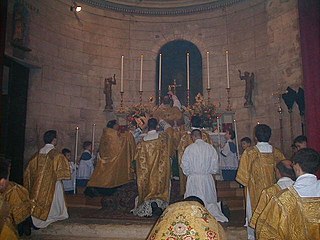
Vestments are liturgical garments and articles associated primarily with the Christian religion, especially by Eastern Churches, Catholics, Lutherans, and Anglicans. Many other groups also make use of liturgical garments; among the Reformed (Calvinist) Churches this was a point of controversy in the Protestant Reformation and sometimes since, in particular during the Anglican ritualist controversies in England in the 19th century.

A Pontifical High Mass, also called Solemn Pontifical Mass, is a Solemn or High Mass celebrated by a bishop using certain prescribed ceremonies. Although in modern English the word "pontifical" is almost exclusively associated with the pope, any bishop may be properly called a pontiff. Thus, the celebrant of a Pontifical High Mass may be the pope, any bishop or any other prelate who is allowed to wear pontificals.
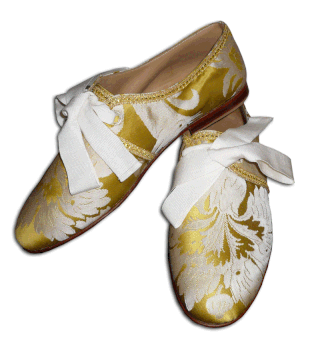
Episcopal sandals, also known as pontifical sandals, are a Catholic pontifical vestment worn by bishops when celebrating liturgical functions according to the pre–Vatican II rubrics, for example a Tridentine Solemn Pontifical Mass.
Ecclesia Dei is the document Pope John Paul II issued on 2 July 1988 in reaction to the Ecône consecrations, in which four priests of the Society of Saint Pius X were ordained as bishops despite an express prohibition by the Holy See. The consecrating bishop and the four priests consecrated were excommunicated. John Paul called for unity and established the Pontifical Commission Ecclesia Dei to foster a dialogue with those associated with the consecrations who hoped to maintain both loyalty to the papacy and their attachment to traditional liturgical forms.
Doctor of Canon Law is the doctoral-level terminal degree in the studies of canon law of the Roman Catholic Church. It can also be an honorary degree awarded by Anglican colleges. It may also be abbreviated ICD or dr.iur.can., ICDr, DCL, DCnl, DDC, or DCanL. A doctor of both laws is a JUD or UJD.
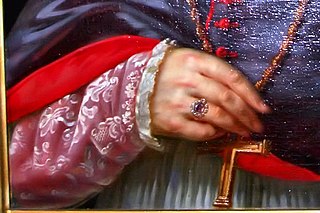
An ecclesiastical ring is a finger ring worn by clergy, such as a bishop's ring.
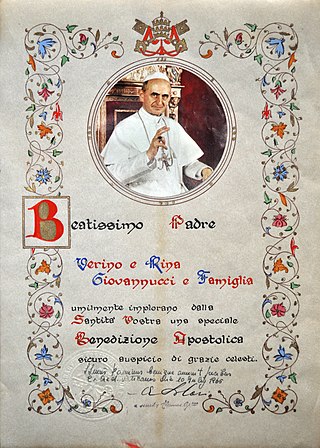
The apostolic blessing or papal blessing is a blessing imparted by the pope, either directly or by delegation through others. Bishops are empowered to grant it three times a year and any priest can do so for the dying.
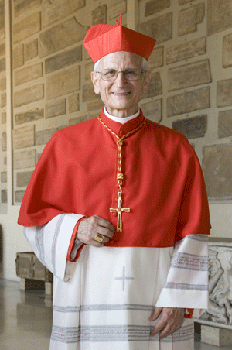
Raffaele Farina SDB is an Italian cardinal of the Catholic Church. He was Archivist of the Vatican Secret Archives, Librarian of the Vatican Library, and president of Scuola Vaticana di Paleografia, Diplomatica e Archivistica. Farina was elevated to the cardinalate in 2007.
Summorum Pontificum is an apostolic letter of Pope Benedict XVI, issued in July 2007. This letter specifies the circumstances in which priests of the Latin Church could celebrate Mass according to what Benedict XVI called the "Missal promulgated by Blessed John XXIII in 1962" and administer most of the sacraments in the form used before the liturgical reforms that followed the Second Vatican Council.
Pontifical vestments, also referred to as episcopal vestments or pontificals, are the liturgical vestments worn by bishops in the Catholic, Eastern Orthodox, Oriental Orthodox, Anglican, and some Lutheran churches, in addition to the usual priestly vestments for the celebration of the mass, other sacraments, sacramentals, and canonical hours. The pontifical vestments are only worn when celebrating or presiding over liturgical functions. As such, the garments should not be confused with choir dress, which are worn when attending liturgical functions but not celebrating or presiding.
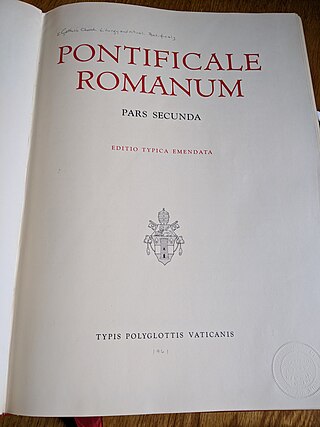
The Roman Pontifical is the pontifical as used by the Roman Rite of the Catholic Church. It is the liturgical book that contains the rites and ceremonies usually performed by bishops of the Roman Rite.

The Bishops-Assistant at the Pontifical Throne were ecclesiastical titles in the Roman Catholic Church. It designated prelates belonging to the Papal Chapel, who stood near the throne of the Pope at solemn functions. They ranked immediately below the College of Cardinals and were also Counts of the Apostolic Palace. Assistants at the Pontifical Throne, unless specifically exempted, immediately enter the Papal nobility as Counts of Rome.
A pontifical is a Christian liturgical book containing the liturgies that only a bishop may perform. Among the liturgies are those of the ordinal for the ordination and consecration of deacons, priests, and bishops to Holy Orders. While the Roman Pontifical and closely related Ceremonial of Bishops of the Roman Rite are the most common, pontificals exist in other liturgical traditions.

The episcopal or pontifical blessing is a blessing imparted by a bishop, especially if using a formula given in official liturgical books.

Mark Edward Brennan is an American prelate of the Roman Catholic Church who is bishop of the Diocese of Wheeling-Charleston in West Virginia. He was installed on August 22, 2019. Brennan previously served as an auxiliary bishop of the Archdiocese of Baltimore in Maryland from 2017 to 2019.

The Coronation of the Emperor of Brazil was the religious act of consecration during which the monarchs of the Empire of Brazil were solemnly blessed, anointed, crowned, invested with the other items of the imperial regalia and enthroned, according to the usages of the Catholic Church, the Empire's official, established Church. The coronation of the Brazilian monarch confirmed the accession of a new emperor to the throne, and corresponded to similar rites that took place in other Christian monarchies. The two Brazilian emperors, Pedro I and Pedro II underwent the ceremony of coronation, on 1 December 1822 and 18 July 1841, respectively. Those remain the two sole acts of coronation that took place in the South American continent.